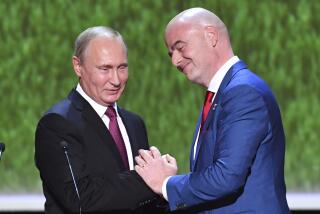Corruption, Scandal Hit East European Soccer
- Share via
VIENNA, Austria — With a couple of potatoes, a chicken, some wine and a little firewood you can fix a meal. In Romania, you can also fix a soccer game.
A lot of things Westerners take for granted are in short supply in Eastern Europe and the state-controlled soccer federations are finding out that players, referees and even the people who run the leagues have their hands out.
And a well-placed chicken-in-the-hand has proven to be worth a goal-in-the-net.
At times the fix has been so obvious crowds erupted in chants of “the thieves, the thieves” and authorities were forced to change the outcome of games.
In energy- and food-short Romania, the government-controlled media said referees have been bribed with such rare goods as meat, poultry, potatoes and wine.
In one case, a referee was caught by police after a game with a car trunk filled with chopped firewood, a hotly sought item during the winter.
Sports reporters for the state-run press privately say they often hear more than they are allowed to write, and the biggest corruption cases are seldom revealed.
Even team and league officials have been involved.
Despite strict governmental controls, teams have been know to skim off money to buy a match when in danger of dropping in classification.
Last month, many of the 60,000 fans watching the Romanian army team play the team representing the police’s Interior Ministry stormed onto the field after a referee disallowed a crucial goal. Police had to be called in to restore order.
A special sports commission which investigated the incident said the referee disallowed a “perfectly valid” goal and suspended him for one year because of “serious deviations from (refereeing) rules.”
The commission validated the goal and awarded the victory to the army club by a 2-1 score.
There were no specific charges of bribe taking in the case, but matches between the sports archrival army and police clubs, which are the most powerful and best financed in the Soviet bloc, are a nightmare for any referee.
In Yugoslavia, controversy has surrounded the first division soccer championship for the last three years.
This season, Red Star of Belgrade won the title with 45 points, one point ahead of its only rival Partizan, when it scored in the last minute to draw 2-2 against Sutjeska in Niksic.
Sports Yugoslav commentators generally agreed that Red Star’s second goal, which sparked a free-for-all on the field in which police had to intervene to protect the referees, was scored from an offside position.
Sutjeska was relegated to the second division after Celik, trailing 0-2 in its game against last-placed Pristina, managed to score three goals within the last 90 seconds of the match to win 3-2.
The state soccer federation suspended the results of the two matches but a three-week investigation said it could not find anything unusual.
“An attempt to legalize corruption, bribery and immorality,” the daily Politika Ekspres commented on the federation’s decision. The state Tanjug news agency described the matches as “a new farce in Yugoslav soccer.”
Soccer shenanigans have not spared Hungary either.
In June, the results and standings in the 1987-88 Hungarian First Division soccer championship were suspended amid allegations that bribes decided the outcome.
One commentator said the accusations, reported in Hungarian newspapers, had turned the Hungarian socccer establishment into a “beehive of strife.”
A state control commission which launched a probe reportedly found no evidence of money passing hands but Soccer Federation President Jenoe Somogyi resigned soon after.
In the biggest public bloc scandal to date, Bulgaria’s Communist Party ordered three years ago the disbanding of the country’s two top soccer clubs after a chaotic championship match marred by fouls and expulsions.
More to Read
Sign up for Essential California
The most important California stories and recommendations in your inbox every morning.
You may occasionally receive promotional content from the Los Angeles Times.








